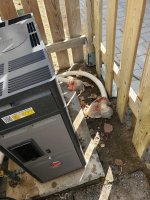Hey guys,
I inherited a pool when I bought a house last fall, and the set up includes a Raypak Heater (Model 156). I just have a few (probably stupid) questions.
1) During my summer start up, should I try to isolate the heater from the system? My pH is likely going to be low on start-up and I don’t want to do any damage to the coils.
2) On a related note, I honestly don’t know how to do that. The plumbing is not pvc pipes, but rather flexible tubing… I have seen posts on how to set up a bypass system with a T split and a check valve on the other side, but is this possible if I only have the tubing? If so, what should I be looking for?
3) In the manual for the heater, it specifically says in bold, not to exceed 5 ppm of FC…. should that warning be seriously considered? If so I suppose I would constantly have to be on the low end of the recommended FC range (5-7) for the lowest recommended CYA (40ppm)
4) In relation to future possible SLAMs, similar to question 3, would I have to isolate the heater from the system in that case?
5) And finally, probably the stupidest question, I assume if it’s shut off, the water runs through the heater normally? For example, if the weather and solar cover are capable of maintaining the desired temp for weeks, I can shut off the heater (power button & gas valve) and the water will continue to circulate through the heater, it just won’t be heating the water?
Thank you in advance! Haley
I inherited a pool when I bought a house last fall, and the set up includes a Raypak Heater (Model 156). I just have a few (probably stupid) questions.
1) During my summer start up, should I try to isolate the heater from the system? My pH is likely going to be low on start-up and I don’t want to do any damage to the coils.
2) On a related note, I honestly don’t know how to do that. The plumbing is not pvc pipes, but rather flexible tubing… I have seen posts on how to set up a bypass system with a T split and a check valve on the other side, but is this possible if I only have the tubing? If so, what should I be looking for?
3) In the manual for the heater, it specifically says in bold, not to exceed 5 ppm of FC…. should that warning be seriously considered? If so I suppose I would constantly have to be on the low end of the recommended FC range (5-7) for the lowest recommended CYA (40ppm)
4) In relation to future possible SLAMs, similar to question 3, would I have to isolate the heater from the system in that case?
5) And finally, probably the stupidest question, I assume if it’s shut off, the water runs through the heater normally? For example, if the weather and solar cover are capable of maintaining the desired temp for weeks, I can shut off the heater (power button & gas valve) and the water will continue to circulate through the heater, it just won’t be heating the water?
Thank you in advance! Haley


